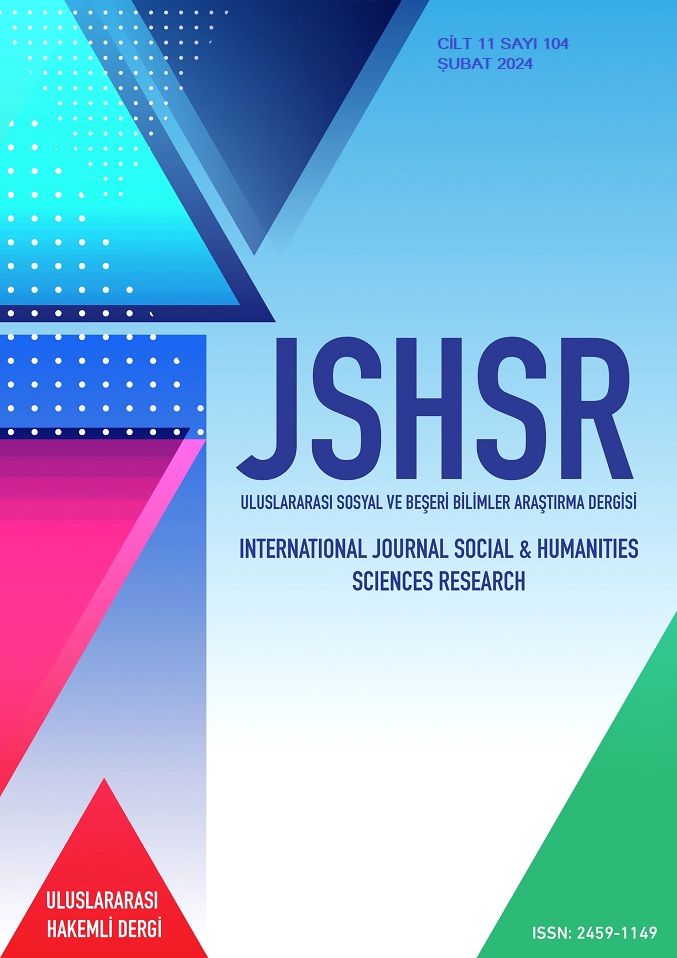Eğitimde Yapay Zekanın Kapsamlı İncelenmesi: Web of Science Veri Tabanı Üzerinden Bir AI Destekli Bibliyometrik Analiz
DOI:
https://doi.org/10.5281/zenodo.10737254Anahtar Kelimeler:
Yapay Zeka, Eğitimde Yapay Zeka, AI Destekli Bibliyometrik Analiz, Eğitim AraştırmalarıÖzet
Yapay Zeka (AI), eğitim alanında karşılaşılan pek çok zorluğun üstesinden gelme, öğretim ve öğrenme süreçlerini yenileme ve bu alandaki ilerlemeyi hızlandırma potansiyeline sahiptir. Bu çalışmanın amacı, eğitim bilimleri alanında yapay zeka ile ilgili yapılan araştırmaların Web of Science (WoS) veri tabanı üzerinden AI destekli bibliyometrik analizini gerçekleştirmektir. Bu amaçla, bibliyometrik analiz teknikleri kullanılarak, eğitim bilimleri kategorisinde yer alan 3604 adet akademik çalışmanın verileri incelenmiştir. Ek olarak yazar anahtar kelimeleri, anahtar kelimeler ve atıf raporlarına göre sınıflandırılan ilk 100 makalenin başlıklarından çıkan temalar ve kategoriler de voyant-tools, GPT-4, Claude AI ve Gemini kullanılarak analiz edilmiştir. Bulgular, eğitim araştırmalarının disiplinlerarası bir yaklaşımla bilgisayar bilimleri, mühendislik ve sağlık bilimleri gibi alanlarla kesiştiğini göstermektedir. Çalışma, AI'nın eğitimdeki kullanımının pedagojik ve teknolojik boyutların ötesinde etik, politik ve sosyal boyutları da barındırdığını ortaya koymaktadır. AI'nın eğitimdeki potansiyelini tam anlamıyla keşfetmek için sağlık ve biyoteknoloji, sürdürülebilirlik, çevre bilimleri, ekonomi, finans, sanat, kültür, etik, gizlilik ve güvenlik gibi çeşitli alanlarda detaylı araştırmalar gerekmektedir. Bu alanlardaki araştırma boşlukları, AI'nın eğitimdeki geniş potansiyelini ortaya çıkarmak için fırsatlar sunmaktadır.
Referanslar
Borji, A. (2023). A categorical archive of chatgpt failures. arXiv preprint arXiv:2302.03494.
Bozkurt, A. (2023). ChatGPT, Üretken Yapay Zeka ve Algoritmik Paradigma Değişikliği. Alanyazın, 4(1), 63-72. https://doi.org/10.59320/alanyazin.1283282
Chen, L., Chen, P., & Lin, Z. (2020). Artificial Intelligence in Education: A Review. IEEE Access, 8, 75264-75278. https://doi.org/10.1109/ACCESS.2020.2988510
Donthu, N., Kumar, S., Mukherjee, D., Pandey, N., & Lim, W. M. (2021). How to conduct a bibliometric analysis: An overview and guidelines. Journal of Business Research, 133, 285-296.
Dwivedi, Y. K., Kshetri, N., Hughes, L., Slade, E. L., Jeyaraj, A., Kar, A. K., Baabdullah, A. M., Koohang, A., Raghavan, V., Ahuja, M., Albanna, H., Albashrawi, M. A., Al-Busaidi, A. S., Balakrishnan, J., Barlette, Y., Basu, S., Bose, I., Brooks, L., Buhalis, D., & Wirtz, J.… Wright, R. (2023). “So what if ChatGPT wrote it?” Multidisciplinary perspectives on opportunities, challenges and implications of generative conversational AI for research, practice and policy. International Journal of Information Management, 71, 102642. https://doi.org/10.1016/j.ijinfomgt.2023.102642
Farhat, F., Sohail, S. S., & Madsen, D. Ø. (2023). How trustworthy is ChatGPT? The case of bibliometric analyses. Computer Science, https://doi.org/10.1080/23311916.2023.2222988
Khosravi, H., Shafie, M. R., Hajiabadi, M., Raihan, A. S., & Ahmed, I. (2023). Chatbots and ChatGPT: A bibliometric analysis and systematic review of publications in Web of Science and Scopus databases. arXiv preprint arXiv:2304.05436. https://doi.org/10.48550/arXiv.2304.05436
Kirtania, D. K. (2023). ChatGPT as a tool for bibliometrics analysis: Interview with ChatGPT (March 17, 2023). Social Science Research Network. https://ssrn.com/abstract=4391794
Köse, B., Radıf, H., Uyar, B., Baysal, İ. & Demirci, N. (2023). Öğretmen Görüşlerine Göre Eğitimde Yapay Zekanın Önemi, Journal of Social, Humanities and Administrative Sciences, 9(71):4203-4209. DOI: http://dx.doi.org/10.29228/JOSH AS.74125
Madsen, D. Ø., Farhat, F., Silva, E. S., Hassani, H., Sohail, S. S., Himeur, Y., Alam, M. A., & Zafar, A. (2023). The scholarly footprint of ChatGPT: A bibliometric analysis of the early outbreak phase. Frontiers in Artificial Intelligence, 6. https://doi.org/10.3389/frai.2023.1270749
Morgan, D. L. (2023). Exploring the use of artificial intelligence for qualitative data analysis: The case of ChatGPT. International Journal of Qualitative Methods, 22, 1–10.
Schmidt, F. (2008). Meta-analysis: A constantly evolving research integration tool. Organizational Research Methods, 11(1), 96-113. doi:10.1177/1094428107303161
Sohail, S. S., Farhat, F., Himeur, Y., Nadeem, M., Madsen, D., & Øivind, S. S and Atalla, Y., Mansoor, W. (2023). The Future of GPT: A Taxonomy of Existing ChatGPT Research. Current Challenges, and Possible Future Directions. SSRN Journal. https://doi.org/10.2139/ssrn.4413921
Sünnetçioğlu, A., Yalıçınkaya, P., Olcay, M. & Mercan, Ş.O. (2017).Turizm Alanında Yazılmış Olan Gastronomiye İlişkin Tezlerin Bibliyometrik Profili, Journal of Tourism and Gastronomy Studies, 5(2), 345-354.
Tosun, A. (2023). Sürdürülebilir Eğitim İçin Yapay Zekâ Modellemesi ile İnovasyona Teorik Bir Bakış. International Social Mentality and Researcher Thinkers Journal, (Issn:2630- 631X) 9(78): 5408-5411. DOI: http://dx.doi.org/10.29228/sm ryj.73883
UNESCO. (t.y.). Artificial intelligence in education. https://www.unesco.org/en/digital-education/artificial-intelligence
Ur Rahiman, H., & Kodikal, R. (2023). Revolutionizing education: Artificial intelligence empowered learning in higher education. Higher Education,. https://doi.org/10.1080/2331186X.2023.2293431
Xue, Y., & Wang, Y. (2022). [Artificial Intelligence for Education and Teaching. Wireless Communications and Mobile Computing https://doi.org/10.1155/2022/4750018
Zhang, H., Wu, C., Xie, J., Lyu, Y., Cai, J., & Carroll, J. M. (2023). Redefining qualitative analysis in the AI era: Utilizing ChatGPT for efficient thematic analysis. arXiv. https://doi.org/10.48550/arXiv.2309.10771
Zupic, I., & Čater, T. (2015). Bibliometric methods in management and organization. Organizational research methods, 18(3), 429-472. https://doi.org/10.1177/1094428114562629
İndir
Yayınlanmış
Nasıl Atıf Yapılır
Sayı
Bölüm
Lisans
Telif Hakkı (c) 2024 International Journal of Social and Humanities Sciences Research (JSHSR)

Bu çalışma Creative Commons Attribution 4.0 International License ile lisanslanmıştır.


